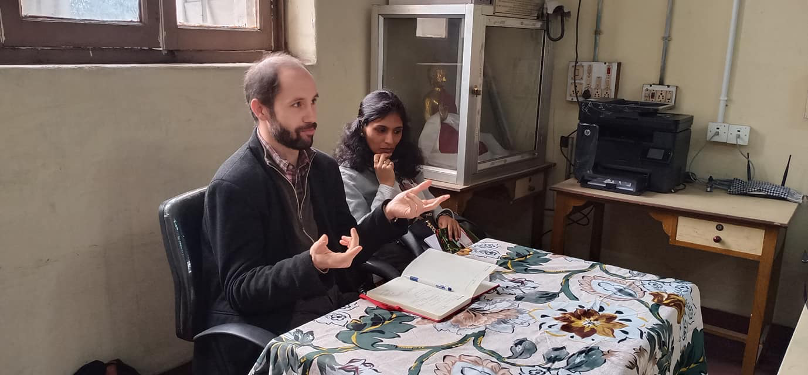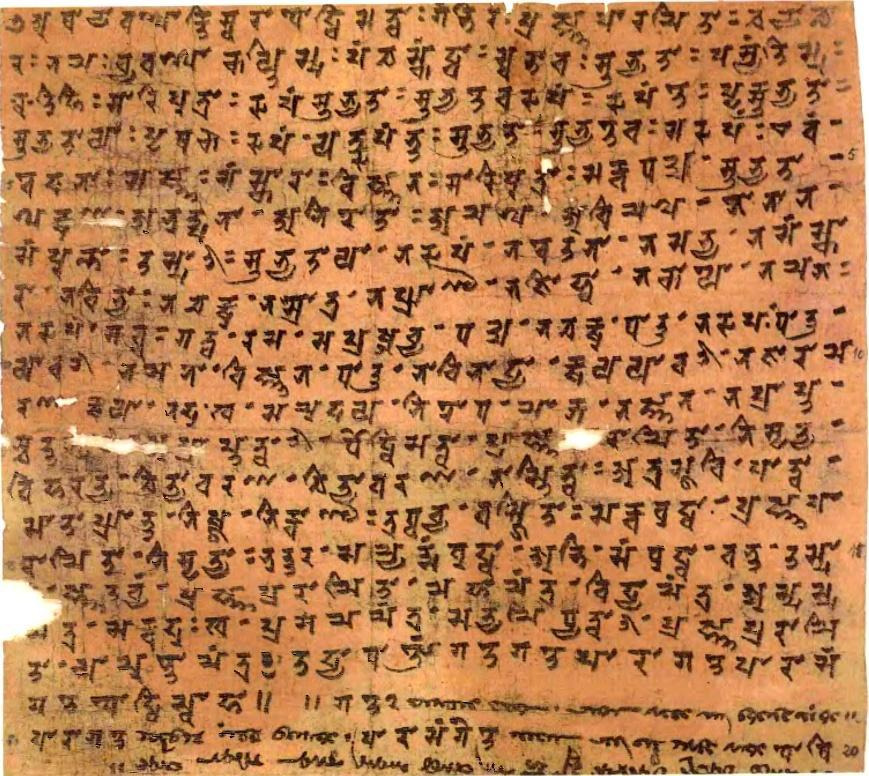This item is part of our special edition ”Buddhist Education in Latin America and Spain

The Dharma-Gaia Foundation, in collaboration with the Autonomous University of Barcelona (UAB), announces the online course “Introduction to Sanskrit: Classical and Buddhist”. This course is aimed at all people interested in exploring and deepening this classical language, which is essential for the study of ancient Buddhist, Hindu and Jain texts. It will be taught by Professor Aleix Ruiz Falqués, PhD in Asian Studies from the University of Cambridge, who has an outstanding academic career.
Sanskrit, considered the most important classical language in Asia, has been the means of transmitting fundamental texts such as the Vedas, the Mahāyāna Sūtras and the Lotus Sutra. Its influence extends from Mongolia and Tibet to Sri Lanka, and from Afghanistan to Japan. This course will allow you to approach these traditions from a linguistic and cultural perspective, offering tools to directly access the original sources. The Autonomous University of Barcelona has been recognized as the best Spanish university in the QS World University Rankings 2024.
contends
In this course, we will explore Sanskrit, considered the most important classical language in Asia and the only language truly shared by the entire continent in cultural and spiritual terms. Through the traditions of Buddhism, Hinduism and Jainism, Sanskrit has woven a rich linguistic tapestry that extends geographically from Mongolia and Tibet to Sri Lanka and from Afghanistan to Japan.
The methodology, implemented through synchronous online classes, integrates a comprehensive approach that combines the systematic study of Sanskrit grammar, learning the Devanāgarī writing system and advanced techniques for reading and analyzing original texts. A distinctive element will be the introduction to “hybrid Buddhist Sanskrit”, an essential linguistic variant for understanding the literature of Mahāvastu and the Mahāyānasūtras, including seminal works such as the Lotus Sutra.
The sessions will include practical exercises that delve into the linguistic, philosophical and cultural aspects of Sanskrit, offering a comprehensive and inclusive vision of religious and secular texts. Students will develop competencies to directly access the primary sources of Asian spiritual and philosophical traditions, with a special emphasis on contextual understanding of texts and their historical and cultural meaning.

Practical Information
Language and scope:
It is taught in Spanish and is aimed at students and the general public interested in the subject, including classical Indian language and literature, Hinduism, Buddhism and Jainism.
Duration:
It will last 25 teaching hours, equivalent to 4 ECTS credits, distributed over 2 hours of class per week through the virtual campus, spread over two days.
Dates and times:
It will be held from April 8 to July 1, 2026, on Mondays and Wednesdays from 17:00 to 18:00 (Barcelona time, Spain), coinciding with the morning in Latin America, making it easier for students from this region to participate.
Teams and UAB Virtual Campus
The classes will be held in a virtual format on the TEAMS platform, and on the Virtual Campus they will have access to study materials, resources and information on related activities.
Matriculation
A maximum of 30 places is offered (minimum 28 for completion), to be filled in strict order of enrollment.
The tuition fee is 120€ (30€ per credit).
Admission requirement:
The only requirement to be admitted is to have completed the secondary education level.
Certifications
At the end of the course, a certificate of achievement will be awarded to participants who successfully complete it, backed by the Autonomous University of Barcelona, which can be a valuable addition to their academic and professional curriculum. The cost of this certificate is not included in the tuition fee.
Academic direction:
Gustavo Pita Céspedes
Daniel Millet Gil
About the instructor:
Aleix Ruiz Falqués has an exceptional academic background. In addition to his doctorate in Asian Studies from the University of Cambridge, he has studied Sanskrit at the University of Pune and has completed a doctorate in the Pali grammatical tradition in Burma. Their in-depth knowledge and experience ensure expert guidance throughout the course, providing students with an in-depth understanding of Sanskrit.
Importance of Sanskrit
Sanskrit constitutes the linguistic vehicle for some of humanity's most influential spiritual, philosophical and literary traditions. As the sacred language of Hinduism and the transmission of Mahāyāna Buddhism, it has been fundamental in shaping Asian thought for more than two millennia. His literature ranges from the oldest Vedas to the Mahāyānasūtras, and includes masterpieces such as the Lotus Sutra, originally composed in Buddhist Sanskrit. Sanskrit, preserved in manuscripts from India, Tibet and other Asian countries, is fundamental to understanding early Buddhism and its schools, as well as Brahmanic-Hindu and Jain texts.

Objectives
In this course we will approach primitive Asian texts by learning the Sanskrit language, with basic grammar exercises and practices oriented, in a very direct way, to the understanding of prose and verse. It consists of language classes with exercises that address basic topics of Buddhism, Hinduism and Jainism. This means that, through words, concepts and formulas that will be analyzed, students will be able to learn first-hand the fundamental ideas of these ancient traditions, from the 5th century BC onward.
The objectives of the course include understanding the structure of Sanskrit sentences and learning to use reference works, both physical and digital, such as grammars, dictionaries and electronic texts. This course is ideal for all those people who have a genuine interest in the original sources of Asian traditions, to learn what the oldest texts of these great cultural traditions say. Both those who practice meditation and want to delve into the texts, as well as people with philosophical, historical or literary inclinations, will find in this program a unique opportunity to directly access ancient teachings.
Contents
Introduction to the Sanskrit language
Basic concepts of Sanskrit terminology
Foundations of Sanskrit grammar
Overview of Sanskrit literature
Reading and analysis of original texts
Registration:
Find here the link to the registration form (available on the UAB website):
Responsible centers:
Faculty of Translation and Interpretation, Department of East Asian Studies
Information and contact person:
For more information, visit the course website or contact the contact person.
Contact: Gustavo Pita Céspedes
E-pošta: gustavo.pita@uab.cat
Telephone: +34 93 586 8901
Additional Information
UAB specialization course
Study Code: 5180/1
1st edition
Credits: 4 ECTS
We invite all interested parties to register and take advantage of this opportunity to expand their knowledge and deepen their understanding of Sanskrit. Whether you're a student of Asian studies, a practitioner of Buddhism or Hinduism, or simply someone with a deep interest in ancient languages and cultures, this course will offer you a unique and valuable educational experience.
Take advantage of this unique opportunity to learn from an expert and dive into the fascinating world of Sanskrit!
Useful links:
Faculty of Translation and Interpretation of the Autonomous University of Barcelona
Articles published in Bdhistdoor in Spanish
”The situation of Buddhist studies in Spain: educational programs” by Juan Arnau Navarro, Montse Castellà Olivé, Francisco Díez de Velasco, Ricardo Guerrero Diáñez, Basili Llorca Martínez, Daniel Millet Gil, Agustín Pániker Vilaplana, Aleix Ruiz Falqués, Jaume Vallverdú Vallverdú, Abraham Vélez de Cea.
”Presentation of the book In the words of the Buddha. An Anthology of Discourses from the Pali Canon, by Bhikkhu BodhI” by Caridad Martin Nieto.
Other related articles published in Buddhistdoor in Spanish
”The expansion of Buddhist studies through the study of Pali: an interview with Aleix Ruiz Falqués” by Dipen Barua and Daniel Millet.
“The Dunhuang Diamond” by Aleix Ruiz-Falqués
”Of free nuns and unfaithful translators” by Aleix Ruiz-Falqués
”Saraṇa Vihāra: a refuge in the Montseny Massif” by Aleix Ruiz-Falqués
Key Publications in Spanish-Speaking Buddhist Studies
Buddhist Studies in Latin America and Spain (Volume I), edited by Daniel Millet Gil and Jaume Vallverdú Vallverdú. This first volume brings together a series of essays that explore the relationship between Buddhism and Spanish-American culture, addressing issues such as the reception of Buddhism in Latin America and Spain, the translations of Buddhist texts into Spanish and the impact of Buddhism on contemporary societies.
Buddhist Studies in Latin America and Spain (Volume II), edited by Daniel Millet Gil and Jaume Vallverdú Vallverdú. The second volume expands the focus of the first, including contributions that analyze Buddhism from interdisciplinary and regional perspectives, with an emphasis on its interaction with local cultural traditions and its impact on the academic environment.
Both volumes are available in PDF format and can be downloaded free of charge through the following links First volume and Second volume










